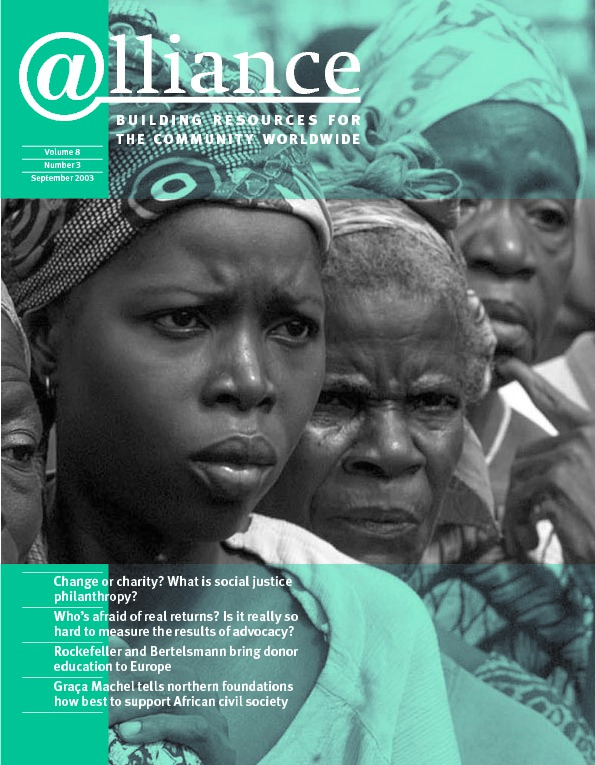Children in Egypt fail to go to school or drop out for many reasons, particularly girls from poor families. In 2000, 57 per cent of girls aged 6-12 had never been in school or had completed only part of primary education. The equivalent figure for boys was 41 per cent. One potential solution is provision of scholarships, but sustaining such programmes year after year is a problem. Could they be supported through community endowment funds? A recent pilot programme by Save The Children in six communities in rural Upper Egypt aims to find out.
The reasons why children fail to attend school are complex. Often parents want to send their children to school but cannot afford it. Although schooling is free, they have to pay for uniforms and school supplies, and often need to enrol them in after-school private tuition groups. Or they cannot afford the ‘luxury’ of taking them out of the labour market.
Looking for sustainable solutions
An earlier project by Save the Children (STC) to increase the enrolment of young Egyptian girls from low-income families in primary education had shown that with persistent support and awareness building, parents can make a shift in their thinking and keep their children in school. But the Access to Primary Education and Literacy for Females (APEAL) project, implemented in 188 schools in four governorates, spent approximately $3.5 million between 1996 and the end of 2002. The large amount of money needed each year meant that this positive experience could not easily be replicated. A more sustainable approach was needed.
In the absence of adequate public funds, academics and economists in Egypt have often advocated for activating endowment funds to cover the cost of education and to ensure accessibility and quality.[1] They provide financial sustainability and the possibility of long-term planning. But they also normally imply large amounts of money. What is different about the STC scheme is that the endowments are small. This makes it feasible for local communities to raise the funds needed to match the STC contribution, which is an essential part of the scheme. It also makes it possible for them to be managed by the relatively small NGOs operating at village level.
The pilot project
The STC pilot project involves setting up six Community Development Funds[2] (hereafter referred to as endowments) in six communities in rural Upper Egypt.
Each endowment is set up with an equal contribution from STC and the community NGO selected as local partner, which commits itself to fundraising to match STC’s contribution. The endowment grant is awarded to the local NGO, both local communities and private sector being reluctant to donate to an endowment fund which is owned by an international NGO. The local NGO will manage the endowment funds, while a village parent teacher committee manages the income/revenue. One year after the endowment is set up, the revenue accrued from interest is used to award scholarships.[3] The objectives are very focused: to support girls’ education and reduce the disparity in school enrolment between boys and girls. The endowment is thus designed to support one rural community and is owned by that community, which will continue to fundraise to increase the fund.
The first endowment was set up in 2001 in a community in Minya Governorate. By the end of 2002, three endowments had been established with a total capital of $100,000. This is expected to increase to $180,000 by September 2003. The communities raised their part of the initial endowment from donations from individuals but are planning to identify private sector donors in the future. In the long term, the main source of endowment funds is the business community, which should be open to arguments about the benefits of an educated society and the need for the business community to adopt good citizenship.
Once the agreement for setting up the fund is signed by the village-based NGO and Save the Children, the endowment is deposited in a bank account opened by the NGO. An advisory board will then be set up with representatives from the community, government, NGO and private sector. One crucial decision to be made is how to invest the money. This will depend partly on what level of risk can be tolerated and partly on what the law permits.
It is hoped that in time a network of the advisory boards of the various endowments will be formed, which will together have access to substantial financial resources in support of education. Such a network, in cooperation with the private sector, could help public schools improve standards, enhance girl’s enrolment in schools through scholarships, and lobby the government for better allocation of resources for quality and accessible education.
1 Mamdouh Al Wala, ‘Activating Endowments to Relieve Government Budget’, in AlAhram Daily (Arabic), 1 Dec 2002, p13.
2 The Wadi’a in Arabic.
3 Typical endowment capital is about $60,000, the revenue from which will allow 200 scholarships per year. The generous contribution of Citicorps Foundation and management support of Citibank in Cairo to this effort is highly appreciated.





Comments (0)